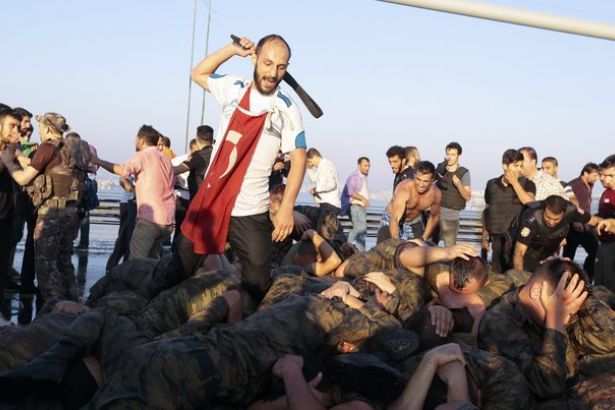Turkey's new decree grants impunity to 'civilians' against coup plots

Turkey's AKP governments recent state of emergency decree projects no legal or criminal liability for those 'civilians' who engaged in lynch events during the bloody night of July 15 coup attempt.
The recent decree published in the official gazette on Dec. 24 amends a previous decree declared in July 2016 following the coup attempt. While the previous decree exempted those state officials, who were assigned for administrative measurements against coup plotters and terror acts, from any legal, administrative, financial and criminal liability, the recent decree also grants impunity to non-official civilians for their deeds against coup plotters or terror acts.
IMPUNITY TO PRO-GOV'T CIVILIANS DURING FUTURE UNRESTS?
"Regardless of their official duties or appointments, any individuals who participated in suppressing the coup attempt on July 15, 2016, terror acts and other acts which are regarded to be a continuation of these, shall be subjected to the first clause," the recent decree says, bringing impunity to 'civilians' in addition to officials as well.
The term on the decree, "regarded to be continuation", has led to an uproar in the country, as it does not state any certain time span but an open-ended process, sowing doubts in the public opinion whether the AKP government is determined to rely on its ‘civilian’ base, let alone the police force, during any possible unrests in the future.
AKP GOV'T LABELS ALL DISSIDENT EVENTS AS 'CONSPIRACY'
As the AKP government’s recent decree has ignited debates in Turkey, President Recep Tayyip Erdoğan’s government is known to label all the peaceful events, protests, rallies and demonstrations as a "coup attempt" for over the past years.
When millions took to the streets around the country in July 2013, particularly in İstanbul’s iconic Taksim Square and Gezi Park, to protest the government’s anti-secular Islamic impositions and anti-environmental policies, AKP government labelled the mass protests of millions of citizens as part of a local and international conspiracy against itself.
Having disregarded the legal demands of the citizens, the AKP government killed 8 citizens during the protests while some pro-government individuals attacked and battered the protesters with clubs and sharp objects.
JIHADISTS TOOK TO THE STREETS ON JULY 15
During the coup attempt masterminded by the Washington, NATO and the U.S-based Islamic preacher Fethullah Gülen’s network, some people took to the streets following Erdoğan’s call for stopping the plotters. Some pro-government armed jihadists and AKP-backed militants from Syria also emerged on the streets during the bloody night, engaging in combat with the military units.
Early in the morning on July 16 when the coup attempt failed, the Islamist supporters of the government lynched some military officials and cadets for having participated in the putsch. İstanbul’s Bosphorus Bridge, which was under the control of military units on late July 15, witnessed the most critical moments of the night of coup.
On the onset of the military putsch attempt, most of the cadets and privates were ordered to participate in the military campaign within the chain of command under the name of "military exercise". However, the paramilitary Islamist forces lynched particularly such young personnel, most of who were under compulsory military service, although they were not informed about the coup and surrendered to the police while high-rank coup plotters were escaping from the country. The pro-government jihadists slit a cadet’s throat on the Bosphorus Bridge.
Erdoğan and his long-time former ally Fethullah Gülen, one of the architects of the July 15 coup attempt, had cooperated in a purging of their opponents within the political spectrum and the army on the grounds that they had intended to "topple down" the AKP government. The alliance of Erdoğan and Gülen had dismissed or put thousands of opponents behind bars, and jointly undermined the secular basis of the country.
Erdoğan’s AKP party sticks to the rhetoric of "conspiracies and coup attempts" for the entire political events of opposition groups, other political parties and citizen groups, and thus bans workers' strikes or civic demonstrations under the pretext of state of emergency.
As the recent decree grants impunity to pro-government "civilians" against terror attacks, most of the people are concerned about whether the AKP party is ready to take the armed support of its political base in the near future, considering that Turkey will face a critical presidential election amid an economic instability and ongoing state of emergency.




